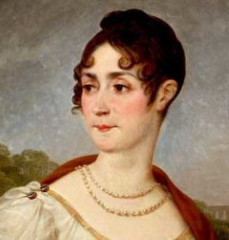Up today is my review of Heather Webb's Becoming Josephine. I received a copy from Netgalley in exchange for my fair and honest review (of course). The novel is an interesting look at the evolution of Rose Tascher de la Pagerie to Rose de Beauharnais to Josephine Bonaparte. Josephine has been a popular subject over the years; most recently Sandra Gulland devoted a three book series to Josephine's rise from plantation raised Creole to Empress of France.
 Ms. Webb's novel opens in Martinique where Josephine began her life as Rose Tascher, the daughter of a wealthy, womanizing plantation owner. When her younger sister Catherine dies, Rose is sent to France to marry Alexandre de Beauharnais. Their marriage is fraught with discord though Rose eventually bears two children--Eugene and Hortense. Interestingly, she successfully seeks a separation from Alexandre who devotes most of his time chasing women and spending his inheritance.
Ms. Webb's novel opens in Martinique where Josephine began her life as Rose Tascher, the daughter of a wealthy, womanizing plantation owner. When her younger sister Catherine dies, Rose is sent to France to marry Alexandre de Beauharnais. Their marriage is fraught with discord though Rose eventually bears two children--Eugene and Hortense. Interestingly, she successfully seeks a separation from Alexandre who devotes most of his time chasing women and spending his inheritance. Rose is depicted as smart and resourceful even though she is very unlucky in love. Despite her husband's numerous affairs, she never is unfaithful to him. It takes the French Revolution and the eventual imprisonment of both Rose and Alexandre for them to reconcile, though their friendship is cut short by his execution. Through her winning ways and kind nature, Rose is released after the death of Robespierre, and sets about remodeling herself into the ideal Republican socialite. She takes many lovers, and eventually becomes the mistress of Paul Barras, an influential politician. It is he that introduces her to Napoleon Bonaparte, a rising general. Once married, Rose becomes Josephine.
There are many things to like about Becoming Jospehine. It is an interesting and fast paced narrative.
It covers a lot of ground without getting too bogged down in the vast political landscape that it covers. Some may see that as a drawback if they are looking for more information on the Revolution and the subsequent Directoire period that led to Napoleon's ascent. Josephine is a multi-faceted character and the reader feels every change. Starting out as a young, naïve bride, she eventually becomes jaded and rather mercenary, but then ends the novel as a diminished, but proud ex-empress. It is during her middle period that she seems at times obsessed with gaining her financial independence either through business dealings or taking a wealthy lover. The fact that she morphs into this "do as you please" type of woman may leave a sour taste in some readers mouths. Even after her marriage to Napoleon, she continues her affairs until suddenly realizing that she truly loves her husband. Then once again she is put at a disadvantage as Napoleon takes mistress after mistress. His egomania is blamed of course, but then comes the inevitable divorce. The reader can't help but feel sorry for Jospehine as her fall comes as quickly as her ascent. Even though her divorce is painful, Josephine walks away content that she can live her life in relative obscurity. The irony of this situation is that it is Josephine's heirs eventually rule France and marry into some of Europe's greatest dynasties.
Additionally, the novel is not very strong in its nuances of the period. There are several instances of words being used that may have been present in the time period, but felt entirely too modern. "Vacation" is used several times, and Josephine entreats her daughter Hortense to say "hi" at one point. Despite these drawbacks, Becoming Josephine will appeal to many readers, especially those who are not hard core historical fiction lovers. But those who prefer their historicals with a little more depth, may decide to pass on this one.

No comments:
Post a Comment